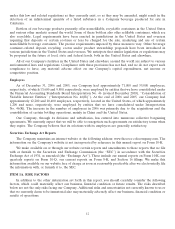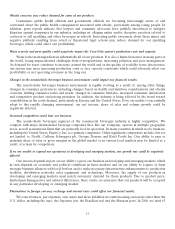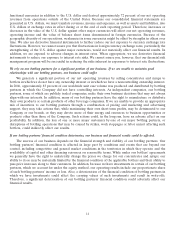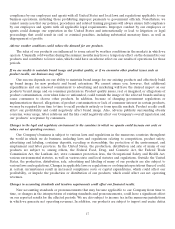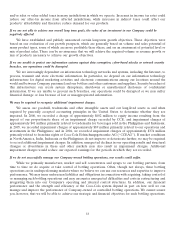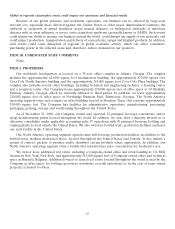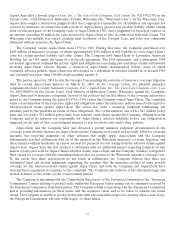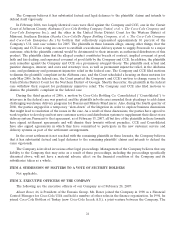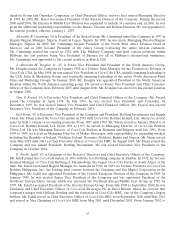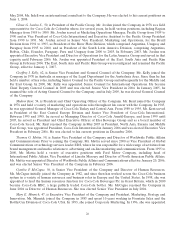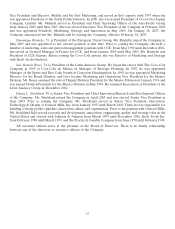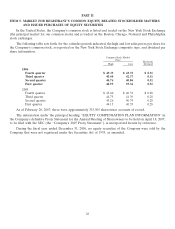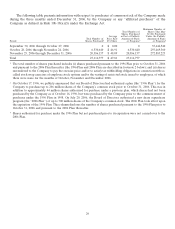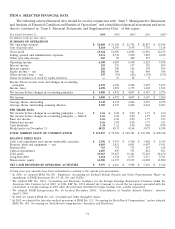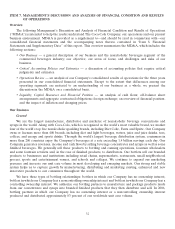Coca Cola 2006 Annual Report Download - page 24
Download and view the complete annual report
Please find page 24 of the 2006 Coca Cola annual report below. You can navigate through the pages in the report by either clicking on the pages listed below, or by using the keyword search tool below to find specific information within the annual report.In May and July 2005, two putative class action lawsuits (Selbst v. The Coca-Cola Company and Douglas N.
Daft and Amalgamated Bank, et al. v. The Coca-Cola Company, Douglas N. Daft, E. Neville Isdell, Steven J. Heyer
and Gary P. Fayard) alleging violations of the anti-fraud provisions of the federal securities laws were filed in the
United States District Court for the Northern District of Georgia against the Company and certain current and
former executive officers. These cases were subsequently consolidated, and an amended and consolidated
complaint was filed in September 2005. The purported class consists of persons, except the defendants, who
purchased Company stock between January 30, 2003, and September 15, 2004, and were damaged thereby. The
amended and consolidated complaint alleges, among other things, that during the class period the defendants
made false and misleading statements about (a) the Company’s new business strategy/model, (b) the Company’s
execution of its new business strategy/model, (c) the state of the Company’s critical bottler relationships, (d) the
Company’s North American business, (e) the Company’s European operations, with a particular emphasis on
Germany, (f) the Company’s marketing and introduction of new products, particularly Coca-Cola C2, and
(g) the Company’s forecast for growth going forward. The plaintiffs claim that as a result of these allegedly false
and misleading statements, the price of the Company stock increased dramatically during the purported class
period. The amended and consolidated complaint also alleges that in September and November of 2004, the
Company and E. Neville Isdell acknowledged that the Company’s performance had been below expectations,
that various corrective actions were needed, that the Company was lowering its forecasts, and that there would
be no quick fixes. In addition, the amended and consolidated complaint alleges that the charge announced by
the Company in November 2004 should have been taken early in 2003 and that, as a result, the Company’s
financial statements were materially misstated during 2003 and the first three quarters of 2004. The plaintiffs, on
behalf of the putative class, seek compensatory damages in an amount to be proved at trial, extraordinary,
equitable and/or injunctive relief as permitted by law to assure that the class has an effective remedy, award of
reasonable costs and expenses, including counsel and expert fees, and such other further relief as the Court may
deem just and proper. On November 21, 2005, the Company and the individual parties filed a motion to dismiss
the amended and consolidated complaint. The plaintiffs filed their response to that motion on January 27, 2006.
On September 29, 2006, the Court entered its order granting the Company’s motion to dismiss the amended
complaint in its entirety and granted the plaintiffs 20 days from its date of entry within which to seek leave to
file a second amended complaint to attempt to correct deficiencies noted therein. On October 23, 2006,
plaintiffs advised the court that they would not seek leave to file a second amended complaint thereby
concluding this matter.
On June 30, 2005, Maryann Chapman filed a purported shareholder derivative action (Chapman v. Isdell, et
al.) in the Superior Court of Fulton County, Georgia, alleging violations of state law by certain individual current
and former members of the Board of Directors of the Company and senior management, including breaches of
fiduciary duties, abuse of control, gross mismanagement, waste of corporate assets and unjust enrichment,
between January 2003 and the date of filing of the complaint that have caused substantial losses to the Company
and other damages, such as to its reputation and goodwill. The defendants named in the lawsuit include Neville
Isdell, Douglas Daft, Gary Fayard, Ronald Allen, Cathleen Black, Warren Buffett, Herbert Allen, Barry Diller,
Donald McHenry, Sam Nunn, James Robinson, Peter Ueberroth, James Williams, Donald Keough, Maria
Lagomasino, Pedro Reinhard, Robert Nardelli and Susan Bennett King. The Company is also named a nominal
defendant. The complaint further alleges that the September 2004 earnings warning issued by the Company
resulted from factors known by the individual defendants as early as January 2003 that were not adequately
disclosed to the investing public until the earnings warning. The factors cited in the complaint include (i) a
flawed business strategy and a business model that was not working; (ii) a workforce so depleted by layoffs that it
was unable to properly react to changing market conditions; (iii) impaired relationships with key bottlers; and
(iv) the fact that the foregoing conditions would lead to diminished earnings. The plaintiff, purportedly on
behalf of the Company, seeks damages in an unspecified amount, extraordinary equitable and/or injunctive
relief, restitution and disgorgement of profits, reimbursement for costs and disbursements of the action, and
such other and further relief as the Court deems just and proper. The Company’s motion to dismiss the
complaint and the plaintiff’s response were filed and fully briefed. The Court heard oral argument on the
22


